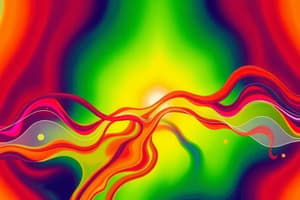Podcast
Questions and Answers
What is the definition of energy?
What is the definition of energy?
- The energy stored within the collection of neutrons and protons in an atom.
- The capacity to do work. (correct)
- The energy associated with the random motion of atoms and molecules.
- The measurement of the average kinetic energy of particles in a substance.
What type of energy is associated with the random motion of atoms and molecules?
What type of energy is associated with the random motion of atoms and molecules?
- Nuclear energy
- Thermal energy (correct)
- Chemical energy
- Potential energy
What is the definition of thermochemistry?
What is the definition of thermochemistry?
- The scientific study of the conversion of other forms of energy into heat.
- The scientific study of the conversion of heat into other forms of energy.
- The scientific study of the interconversion of heat and other kinds of energy. (correct)
- The scientific study of the measurement of thermal energy.
What is an open system?
What is an open system?
What is the definition of heat?
What is the definition of heat?
What is the difference between temperature and thermal energy?
What is the difference between temperature and thermal energy?
What type of system allows the transfer of energy but not mass?
What type of system allows the transfer of energy but not mass?
What type of energy is stored within the bonds of chemical substances?
What type of energy is stored within the bonds of chemical substances?
What is the total energy of the universe according to the First Law of Thermodynamics?
What is the total energy of the universe according to the First Law of Thermodynamics?
What is the formula for the First Law of Thermodynamics?
What is the formula for the First Law of Thermodynamics?
What is the definition of work in thermodynamics?
What is the definition of work in thermodynamics?
What are thermodynamic state functions?
What are thermodynamic state functions?
What is an example of an endothermic process?
What is an example of an endothermic process?
What is the study of heat change in chemical reactions?
What is the study of heat change in chemical reactions?
Flashcards are hidden until you start studying
Study Notes
Thermochemistry
- Energy is the capacity to do work and can be classified into different types: thermal energy (associated with the random motion of atoms and molecules), chemical energy (stored within the bonds of chemical substances), nuclear energy (stored within the collection of neutrons and protons in the atom), and potential energy (stored energy that depends on the relative position of various parts of a system).
Systems
- There are three types of systems: open systems (can exchange mass and energy), closed systems (allow the transfer of energy but not mass), and isolated systems (do not allow the transfer of either mass or energy).
Thermodynamics
- Thermodynamics is the scientific study of the interconversion of heat and other kinds of energy.
- Heat (q) is the transfer of thermal energy between two bodies at different temperatures.
- Temperature is a measure of the thermal energy, and it is different from thermal energy (temperature measures the average kinetic energy of the particles in a substance, while thermal energy measures the total kinetic energy).
First Law of Thermodynamics
- The First Law states that the energy of the universe is constant (E = q + w).
- Heat (q) is the energy transferred between two bodies, and work (w) is the force acting over a distance (w = F x d).
Thermodynamic State Functions
- Thermodynamic state functions are thermodynamic properties that depend only on the state of the system, not the pathway (examples: energy, pressure, volume, temperature).
- The change in thermodynamic state functions is calculated by subtracting the initial value from the final value (ΔE = Efinal - Einitial, ΔP = Pfinal - Pinitial, ΔV = Vfinal - Vinitial, ΔT = Tfinal - Tinitial).
- Other variables, such as q and w, depend on the pathway and are called path functions.
Thermochemistry
- Thermochemistry is the study of heat changes in chemical reactions.
- Exothermic processes are reactions that give off heat (transfer thermal energy from the system to the surroundings).
- Endothermic processes are reactions that require heat to be supplied from the surroundings to the system.
Studying That Suits You
Use AI to generate personalized quizzes and flashcards to suit your learning preferences.




